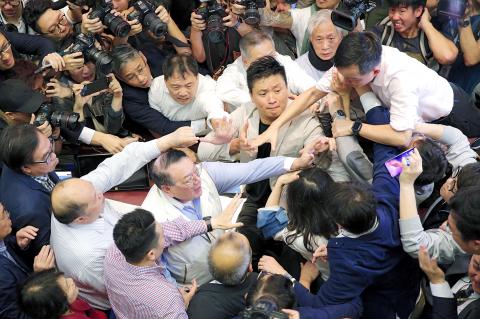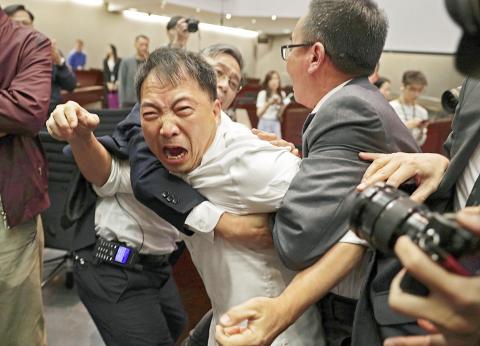Hong Kong’s legislative assembly descended into chaos yesterday as lawmakers for and against amendments to the territory’s extradition law clashed over access to the chamber.
At least one lawmaker was taken from the chamber on a gurney after apparently fainting during the morning melee, in which legislators pushed and shoved each other on the floor, amid seats and tables and in an adjoining hallway.
The amendments have been widely criticized as eroding the semi-autonomous Chinese territory’s judicial independence by making it easier to send criminal suspects to mainland China, where they could face vague national security charges and unfair trials.

Photo: AP
Under the “one country, two systems” framework, Hong Kong was guaranteed the right to retain its own social, legal and political systems for 50 years following its handover from British to Chinese rule in 1997.
However, the Chinese Communist Party has been seen as increasingly reneging on that agreement by forcing through unpopular legal changes.
Legislators in the pro-Beijing camp attempted to seat Abraham Razack (石禮謙), also known as Abraham Shek, who had been named earlier in the week through another committee and a contested interpretation of council rules to replace pro-democrat James To (涂謹申) as head of the Bills Committee.

Photo: AP
To had stalled passage of the legislation over two sessions and Razack was seen as the best chance to push it through before the July recess.
However, pro-democracy legislators continued to claim that To was the legitimate chief of the committee guiding discussion of the proposed new law.
They and their opponents had scheduled rival meetings on the same topic in the same Legislative Council meeting room yesterday, starting just 30 minutes apart.
The rival committees both claimed to be in charge of the same process of scrutinizing the new law before deciding on whether to vote on it.
At one point, Wu Chi-wai (胡志偉), the Democratic Party chairman who tried to stop Shek from presiding over the meeting, shouted at him, saying: “Don’t be a sinner for a thousand years! Don’t sell out Hong Kong.”
The legislator removed by paramedics was identified as Gary Fan Kwok-wai (範國威) of the Neo Democrats.
The amendments expand the scope for the transfer of criminal suspects to China and remove the legislature’s right to scrutinize individual extradition decisions filed by Hong Kong’s chief executive.
They could also open the way for further measures to erode Hong Kong’s civil liberties, including the passage of anti-subversion legislation that has been strongly opposed by many.
Yesterday’s legislative scuffle came weeks after a Hong Kong court handed down prison sentences of up to 16 months to eight leaders of massive 2014 pro-democracy protests on public nuisance charges.

WAITING GAME: The US has so far only offered a ‘best rate tariff,’ which officials assume is about 15 percent, the same as Japan, a person familiar with the matter said Taiwan and the US have completed “technical consultations” regarding tariffs and a finalized rate is expected to be released soon, Executive Yuan spokeswoman Michelle Lee (李慧芝) told a news conference yesterday, as a 90-day pause on US President Donald Trump’s “reciprocal” tariffs is set to expire today. The two countries have reached a “certain degree of consensus” on issues such as tariffs, nontariff trade barriers, trade facilitation, supply chain resilience and economic security, Lee said. They also discussed opportunities for cooperation, investment and procurement, she said. A joint statement is still being negotiated and would be released once the US government has made

NEW GEAR: On top of the new Tien Kung IV air defense missiles, the military is expected to place orders for a new combat vehicle next year for delivery in 2028 Mass production of Tien Kung IV (Sky Bow IV) missiles is expected to start next year, with plans to order 122 pods, the Ministry of National Defense’s (MND) latest list of regulated military material showed. The document said that the armed forces would obtain 46 pods of the air defense missiles next year and 76 pods the year after that. The Tien Kung IV is designed to intercept cruise missiles and ballistic missiles to an altitude of 70km, compared with the 60km maximum altitude achieved by the Missile Segment Enhancement variant of PAC-3 systems. A defense source said yesterday that the number of

Taiwanese exports to the US are to be subject to a 20 percent tariff starting on Thursday next week, according to an executive order signed by US President Donald Trump yesterday. The 20 percent levy was the same as the tariffs imposed on Vietnam, Sri Lanka and Bangladesh by Trump. It was higher than the tariffs imposed on Japan, South Korea and the EU (15 percent), as well as those on the Philippines (19 percent). A Taiwan official with knowledge of the matter said it is a "phased" tariff rate, and negotiations would continue. "Once negotiations conclude, Taiwan will obtain a better

FLOOD RECOVERY: “Post-Typhoon Danas reconstruction special act” is expected to be approved on Thursday, the premier said, adding the flood control in affected areas would be prioritized About 200cm of rainfall fell in parts of southern Taiwan from Monday last week to 9am yesterday, the Central Weather Administration (CWA) said. Kaohsiung’s Taoyuan District (桃源) saw total rainfall of 2,205mm, while Pingtung County’s Sandimen Township (三地門) had 2,060.5mm and Tainan’s Nanhua District (南化) 1,833mm, according to CWA data. Meanwhile, Alishan (阿里山) in Chiayi County saw 1,688mm of accumulated rain and Yunlin County’s Caoling (草嶺) had 1,025mm. The Pingtung County Government said that 831 local residents have been pre-emptively evacuated from mountainous areas. A total of 576 are staying with relatives in low-lying areas, while the other 255 are in shelters. CWA forecaster